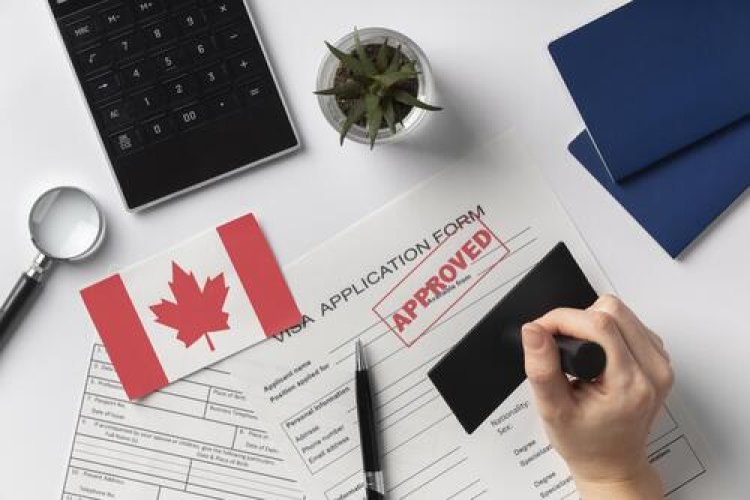Canada Visitor Visa Interview: Common Questions and How to Answer Them
Prepare for your Canada visitor visa interview with confidence. Discover common questions, what they really mean, and how to answer them with clarity and purpose to increase your chances of approval.
Share this Post to earn Money ( Upto ₹100 per 1000 Views )

After nearly a decade guiding applicants through Canada's visitor visa process, I've seen these same questions reduce confident professionals to nervous professionals. Yet they're simply about your life, plans, and intentions—topics nobody knows better than you.
The Hidden Purpose Behind Every Question
Immigration officers aren't trying to trip you up. Their main goal? Determining if you'll return home when your authorised stay expires. Every question, casual as it may seem, serves this purpose.
Let's break down these questions and turn them from interrogation points into opportunities to prove your credibility.
Question 1: "Why do you want to visit Canada?"
They're asking: "Do you have legitimate, temporary reasons for visiting?"
How to answer: Specifics beat generic responses every time. Instead of "I want to see Canada," try "I've planned a 12-day trip for my cousin's wedding in Vancouver on June 15th, then I'm heading to Banff National Park—it's been on my bucket list since that documentary I watched back in college."
See the difference? Your second answer shows planning, purpose, and the temporary nature of your visit. This shows planning, purpose, and the temporary nature of your visit. If your reason relates to family, business, or academic collaboration, outline those clearly. Many applicants find it helpful to review country-specific entry requirements and visitor pathways as listed on our Migration in Canada page.
Question 2: "How long do you plan to stay in Canada?"
What they're asking: "Is your trip duration reasonable and consistent with your stated purpose?"
How to answer: Your answer must match your application exactly. Applied for 3 weeks? Don't suddenly mention "maybe a couple months" during your interview. Precision matters. Add context: "I'll be staying 21 days—a week in Toronto meeting business partners, then two weeks touring the east coast before I need to get back for my daughter's graduation ceremony."
Question 3: "What ties do you have to your home country?"
What they're asking: "What will guarantee your return after your visit?"
How to answer: This trips up many applicants. Don't just list stuff you own—talk about responsibilities. "I manage a team of 12 people, and we've got quarterly planning starting August 1st that I need to lead. I'm also halfway through my master's program with classes starting again in September. Plus, my parents are getting older and count on my weekly visits to help with groceries and doctor appointments."
The strength lies in mixing professional, educational, financial, and family obligations that make you need to come back.
Question 4: "How will you finance your trip?"
What they're asking: "Can you afford this visit without working illegally in Canada?"
How to answer: Be precise, not vague. "I've saved CAD$6,000 specifically for this trip. That covers my daily expenses of about CAD$200 for hotels, food and transportation. I've also put aside an extra CAD$1,000 for unexpected costs. My bank statements from the last six months show both these savings and my regular monthly income of $3,500."
Question 5: "Have you travelled internationally before?"
What they're asking: "Do you have a history of following the immigration rules?"
How to answer: If you've traveled before, show your good record: "Yes, I've been to the States three times in the past five years, and the UK last year. Always came back before my visa expired—you can check my passport stamps."
If this is your first big trip, focus on why Canada matters enough to make the journey: "This is my first major international trip. I've been saving specifically for it because my research work with the University of Toronto has reached a point where we need face-to-face meetings to move forward."
The Ultimate Strategy: Authentic Consistency
The most successful applicants aren't those with the flashiest credentials, but those with a coherent story across their application and interview answers. Your documents should match your verbal story. Your travel history should align with your financial resources. Your itinerary should fit your stated purpose.
Remember: these officers review hundreds of applications every week. They've developed a nose for spotting inconsistencies. Your job isn't to impress them with grand plans, but to reassure them with honest, well-supported answers that show you're a legitimate visitor who respects Canadian immigration laws.
Preparation isn't memorizing perfect answers—it's organizing your actual plans and circumstances into clear responses that address their underlying concerns. Need help with your specific situation? Consider booking a consultation with an authorised Canadian Immigration Consultant.
Need expert guidance on your case? Visit our Migration in Canada resource to explore visitor visa streams, study permits, and settlement pathways. And for fresh immigration tips, updates, and case studies, check out the Rackons blog.















